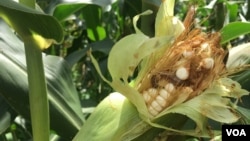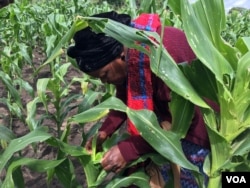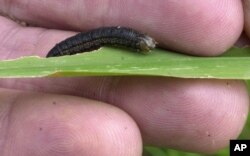Pests known as fall armyworms are destroying crops in southern Africa and have spread north to affect 20 countries.
The fall armyworm is an invasive species that is native to North and South America, said Sina Luchen, regional agronomist for the Food and Agriculture Organization of the United Nations (FAO) in Johannesburg, South Africa.
"These types of shocks normally affect the poorest people, the most vulnerable farmers, and in [sub-Saharan Africa] up to 70 percent of the people derive their food security and livelihoods from agriculture," Luchen told VOA.
Africa has its own species of armyworm, but Luchen said that the fall armyworm has been more harmful because farmers were not aware of the pest and may have been slow in reporting it to authorities.
The fall armyworms destroy maize crops before turning into moths to travel to their next destination. To date, they have destroyed about 300,000 hectares of maize, according to the International Maize and Wheat Improvement Center in Mexico.
The pests have destroyed crops in Zambia, Zimbabwe, Botswana, Namibia, South Africa, Malawi, Mozambique and Swaziland. More recently, farmers in Rwanda, Kenya and Uganda are saying their farms have been hit by the fall armyworms.
A farmer in Kirundo, Burundi, said the local harvest has been decimated.
"If we were to show you our farms, you would be shocked to see the damage they have caused," she told VOA's Central Africa service.
In neighboring Rwanda, the military has joined the fight by airlifting pesticides to affected regions and spraying the crops.
The pests are difficult to eradicate since they have a short life cycle and procreate in abundance. During a two-week life cycle, a moth will lay up to 2,000 eggs, typically on young maize plants. When the larvae hatch, they burrow into the plant and destroy it.
"We, frankly, had no solution," said a Rwandan farmer. "We would spray the crops today, but they would resurface the next day. Now that we have pesticides, I believe this will work, although we would've preferred to have the pesticides a little early. It would have made a difference."
FAO's Luchen said pesticides are also costly. For instance, he said, Brazil has spent up to $600 million per year to manage the armyworm. These farmers do so by applying two sprayings per week while the crop is growing, a costly process that may not be affordable for African farmers.
"That is an intense use of pesticides," Luchen said. "Our farmers in Africa cannot afford the costs of such use of pesticides."
Luchen said the FAO is hoping to teach a more low-cost and eco-friendly approach to combating the fall armyworm.
"What we are advocating for is the use of an integrated approach which looks at not only chemical applications, but also looks at biocontrol. It looks at the use of surveillance systems in order to have early detections to ensure that when interventions are necessary, it will be effective, because this pest is quite tenacious," he said.
Assumpta Kaboyi, Innocent Kimenyi and Jean Bosco Ndarurinze contributed this report.






